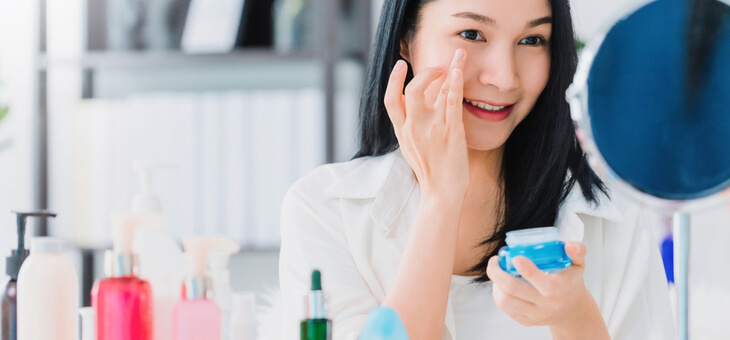Skincare as a whole has exploded in popularity in the past few years. Everybody seems to be taking more care of their skin and telling you exactly what you should buy and try. But just because something worked for one person, doesn’t mean it’ll work for you. Especially if you’ve seen it touted on social media as a new miracle product.
Here are the skincare products that you may be wasting your money on.
Harsh face scrubs
Exfoliating helps to remove dead skin cells from the outer layer of your skin and should be a key part of your skincare regime. As we age, our skin’s natural ability to shed skin cells slows down – which can lead to dull, flaky and congested-looking skin. But exfoliating every day or with harsh scrubs, can strip away layers of natural moisture and irritate your skin.
What to try instead: find a gentle exfoliator and only use it when necessary (start with once a week and see how your skin responds).
Read: How often should you exfoliate your face?
Face mist
They may be perfect for refreshing you during the 2 pm slump, but ultimately, face mists don’t do much for your skin. Spraying your face with droplets certainly isn’t the best way to moisturise it. Saying that, some face mists are better than others.
In order for a face mist to be effective, it must contain humectant ingredients. Look for key ingredients such as lactic acid, glycerine, and hyaluronic acid.
If a mist is humectant and occlusive-free, it’s possible that the spray is actually drying out your skin rather than moisturising it. And if you have sensitive skin, a mist with fragrance may be irritating.
What to try instead: put a layer of moisturiser onto damp skin to feel refreshed and hydrated.
Eye cream
Many eye creams claim to lessen wrinkles and lighten dark undereye circles, but only products containing ingredients such as vitamin C or hydroquinone can lighten pigment under your eyes. Consult your dermatologist before using hydroquinone or bleaching agents.
What you need to keep in mind when it comes to eye creams, is that the ingredients in many popular eye creams actually don’t differ much from a facial moisturiser.
The only real difference tends to be that it’s much less product for a lot more money.
What to try instead: use a high-quality moisturiser all over your face, including your under-eye area.
Read: What is retinol? Is it anti-ageing’s gold standard for skincare?
Activated charcoal masks
Activated charcoal seems to have taken the skincare world by storm. The problem is, there’s no evidence it truly works.
Sure, it can absorb poisons or drugs in your stomach, but research is very limited on how it can help your skin. Some products may also cause reactions, so always do a patch test before using a new product.
What to try instead: remove dirt and bacteria from your face by using a simple cleanser.
Miracle products that claim to make a difference instantly
Your skin is one of a kind and not every product works with every skin type. According to research, it can take anywhere from six to 20 weeks to see a change in your skin.
Retinoids can improve fine lines, wrinkles, and the appearance of age spots but you won’t see instant results.
What to try instead: talk to a dermatologist about products that can address your specific concerns. And don’t be disappointed when your problem areas don’t clear up overnight.
Anti-cellulite lotion
Moisturising can make your skin appear smoother, and an anti-cellulite specific product containing caffeine may tighten the surface of your skin for a while. But it won’t remove your cellulite.
Cellulite is a fat deposit beneath the skin that often causes the appearance of lumpy, dimpled flesh on the thighs, hips, buttocks and stomach. A lotion or moisturiser can’t penetrate your skin and break down the fat deposits.
What to try instead: weight loss and exercise can help improve the appearance of cellulite. Talk to a dermatologist about other treatments such as laser and radio-frequency systems and retinol cream if desired. But be aware, these may need to be repeated regularly.
Skincare specific supplements
Vitamins A, C, E, and B3 are important for skin health, but popping pills probably won’t make a huge difference unless you are actually deficient in something. Look out for signs such as brittle nails, very dry skin or bleeding gums and check with your doctor whether you need to take a supplement.
What to try instead: eat a balanced diet with plenty of fruits and vegetables to get a range of vitamins and minerals.
Read: Is professional strength skincare worth splurging on?
Natural oils for preventing pimples
Cocoa butter, shea butter, and coconut oil can all be good moisturisers. But you may not get the desired results if you use them on your face. Coconut oil can clog pores and oil can worsen pimples if you have already oily skin.
What to try instead: you can treat pimples with benzoyl peroxide or salicylic acid. If your acne is severe, talk to your dermatologist about retinoids, antibiotics, and hormone therapy.
Facial massage
You may feel lovely and relaxed after a face massage, but the physical results probably won’t last long.
What to try instead: still get the facial, just don’t expect long-lasting results.
What does your skincare routine look like? Have you tried any dud products that you wouldn’t recommend? Share your thoughts in the comments section below.
If you enjoy our content, don’t keep it to yourself. Share our free eNews with your friends and encourage them to sign up.

